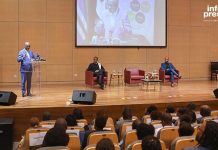Africa-Press – Cape verde. In order to accompany children during hospitalization in the country’s pediatric services, parents need to give up their income if the absences exceed the five days they are entitled to with the employer. This is because, in pediatrics, the follow-up requirement goes up to 9 years, eleven months and 29 days, but the INPS only covers, with sick pay, companions for children up to six months of age. Lawyers point to a gap in the law.
Aware that this is not a new problem, a mother, when facing the situation for the first time and being perplexed by the lack of coherence, which she calls “badly made laws”, decided to bring her displeasure to A NAÇÃO. Her hope is, with her gesture, to provoke a debate around the subject and lead the social security system to wake up to situations experienced by her, as a mother.Last December, Ciliana Lima had to be admitted to the pediatric services of the Agostinho Neto University Hospital, in Praia, as a companion for her daughter, who was one year and three months old at the time. The hospitalization took place in two periods, of five and 10 days, separated by a weekend, due to a worsening in the child’s health condition.
“My daughter had pneumonia, we were hospitalized on a Monday and discharged on Friday. However, in the following morning from Sunday to Monday she got worse again and we went back to the hospital. We were hospitalized again, for another ten days,” she explained, indicating that the case took place between December 13 and 30.
The hospital, as he stressed, does not allow children of this age to be unattended. But, he continues, even if they allowed it, he does not have the conditions, namely the staff, to take care of all the hospitalized children.
“My daughter was medicated every 4 hours and I had to get up at dawn to take her to the medication room, as there was only one nurse to cover the ward. In our room alone were five children,” she points out.
This mother’s astonishment happened, however, when she was finally discharged and discovered, with the INPS, that the medical certificate of temporary incapacity she received from the hospital to deliver to the institution, after all, was of no use to her.
The solution was to negotiate with your employer’s Human Resources, so that 11 days of absence would be deducted from your vacation. It also lost, but at least it was not the entire salary that would be sorely lacking in its budget, even more so in a period of difficulties.
For Ciliana Lima, the law doesn’t make any sense, since six months in a child’s life doesn’t make any difference in relation to their dependence on parental care.
“I went to research and saw that, in Portugal (a country where Cape Verde likes to get the bases for its laws), beyond these six months, there is an observation that says that the companion is not entitled to sickness benefit only if have at least one other person who can accompany the child, being the father or mother. If you can prove that you do not have this alternative, you are entitled to the subsidy”, she exemplifies, explaining that, in her case, she is alone with her daughter in Praia, since her father lives and works on the island of Sal.
The same situation occurs when the child, not being hospitalized, needs follow-up at home, due to illness.This was the case of Nelly Anjos, in São Vicente. In September 2021, the two-year-old son underwent minor surgery and, although he did not need hospitalization, he had to be accompanied at home for seven days to take medication and avoid dangerous situations in the postoperative period.
This mother, too, was alone at home with the child, since the father is a sailor and was on duty on the high seas. “When the doctor gave me seven days at home, he filled out the INPS documents and asked me to stamp them at the hospital and take them to Social Security. The document was stamped, but already at the hospital secretary, I was told that the document would not be accepted by the INPS, because of my son’s age,” he explained.
At the time, Nelly made a post on Facebook to express her indignation. The post was commented on by several other parents, who reported similar situations and their strangeness in the face of this limitation, in a country where, supposedly, its citizens are seen as its main resource.
In the case of Nelly, who was entitled to three days of absence from work, the remaining four days of earnings were lost. But, according to her, what made her saddest was not the monetary loss, but the way this law is applied, in the case of a helpless child. Hive has taken the issue to INPS
According to the president of the Association of Parents and Friends of Children and Young People with Special Needs – Colmeia, Isabel Moniz, this NGO has been raising awareness of the INPS over the years, not only in relation to this subsidy that parents are claiming , but also on various other subsidies that, as you say, are sometimes slow or the system itself does not contribute.
“For example, regarding the reimbursement of therapies, which are not covered. In terms of disability”, he points out, “INPS only covers 65 physiotherapy sessions, when the number was increased by another 25% a year ago”.
Other therapies, such as speech therapy, psychopedagogical monitoring and everything related to neurodevelopment, do not have reimbursement. According to Isabel Moniz, the INPS claims that to cover these modalities, there must be a law in this sense, which does not exist.
However, according to him, this lack of coverage has affected the treatment of children and young people with disabilities, with many unable to follow the treatment plan, which is very costly for families due to lack of resources.
“It is a question of framing that has to be worked on, to give an answer as a whole”, he appeals.
Jurists point out inconsistency and gap in the law
Jorge Duarte, a labor law lawyer, understands that the situation described by the mothers and the president of Colmeia has been put up by several clients, namely with the General Industry, Food, Civil Construction and Services Union (SIACSA), where he works.
In his opinion, there is a gap in the law that regulates Social Security benefits, so the INPS should come to the public to clarify the issue and, if necessary, amend the law to fill this deficiency.
In terms of labor law, he says, there are two situations. On the one hand, “the law tells us that the worker has a limit of absences that he can justify when accompanying someone”. But, on the other hand, “there is another situation, where a medical document or medical board leads the insured to suspend the contract, without losing his income, through the protection of the National Social Security Institute”.
In this case, the INPS pays 70% of the income and the employer pays the remaining 30%, similar to what happens, for example, on maternity leave. Given that the INPS has its own legislation regarding how to act in some situations, the lawyer says that the union has been trying to find a meeting point with the institution, in order to clarify the matter.
“We are working under what the Labor Code tells us, so we need some explanation from the INPS. This is because the labor law determines the number of absences to which the worker is entitled, but, from that limit of absences, there is no entity to bear anything.
Being a health situation, Jorge Duarte understands that, somehow, the INPS should cover the salary or part of the insured person’s salary, until the time to return to work, given that it is a situation of illness of a child, in this case, of children.
Minimum possible principle
According to the jurist Cleidir Dias, in terms of benefits, the INPS is not governed by the principle of justice and fairness, but by the “minimum possible”.
In the case of employers subject to the labor code regime, says the expert, the limit of justified absences goes up to five days, to accompany family members.
“The principle of justice and fairness in social benefits, in fact, would require it to be so, but, in terms of social benefits, where the law does not specify the obligation to cover, the INPS assumes that it has no duty to cover” , explains.
Harmonization measures
Recognizing the injustice of this lack of protection, and as a suggestion, the jurist proposes measures to harmonize professional duties and responsibilities of a parental nature, otherwise the system is “giving with one hand and taking with the other”.
“This is because it makes no sense and is even controversial, the hospitalization of a child is conditional on parental monitoring, and, meanwhile, the parents are unprotected in relation to the employer, since the basis and mainstay of the social security system is the bond labor and employment”, explains Cleidir Dias.
INPS silence
The NAÇÃO tried to hear the INPS in order to clarify the institution’s position regarding the benefits related to the sickness benefit for accompanying children, but this was not possible, despite the emails exchanged since the 25th of January of this year. More than enough time if you wanted to participate in the explanation of this problem, which is far from being an isolated case in the national context.
For More News And Analysis About Cape verde Follow Africa-Press






